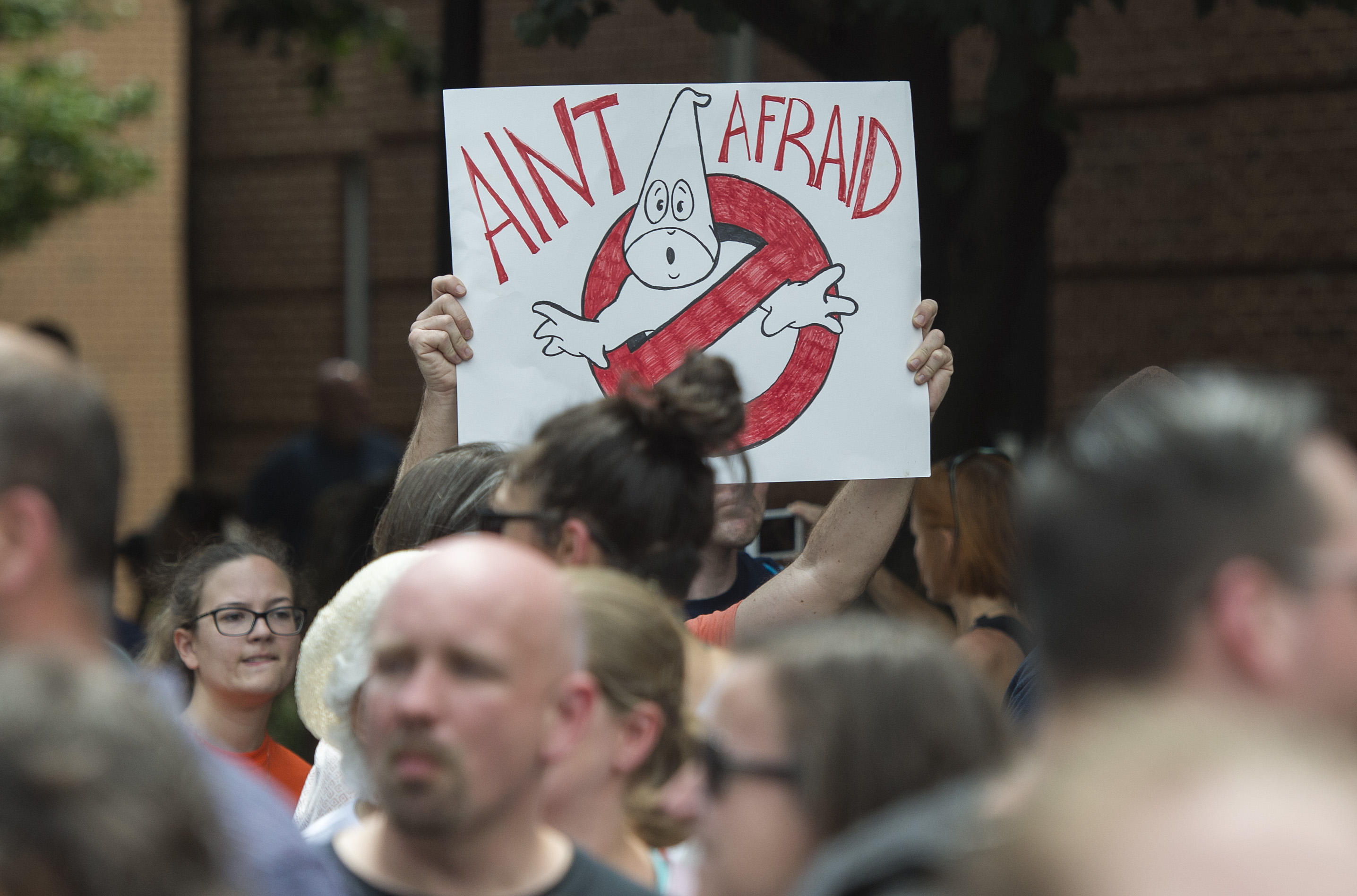Historically speaking, naming Nazis has been an important tool for fighting their ideology. Beyond the Nuremberg Trials, Nazi hunters have spent the decades since World War II scouring the world for perpetrators and collaborators, identifying them, bringing them to trial when possible, and trying to ensure that people are held to account for their horrific actions. History is, of course, full of atrocities, but there’s good reason to treat Nazis as a special kind of evil.
When a group of several hundred white men showed up in Charlottesville, holding tiki torches, and shouting Nazi slogans such as “blood and soil” and other anti-Jewish and racist phrases, a group of Twitter users mobilized quickly to identify these people. Led by an account named “Yes, You’re Racist,” social media users identified and named a number of torch-wielding white supremacists. Some were fired from their day jobs, others merely socially shamed. One student at the University of Nevada–Reno promptly protested that he wasn’t really an “angry racist“—he just wanted to represent European culture.
I’ve spent many years arguing against doxing, especially of left-wing women, for whom doxing often leads to harassment and danger. As the campaign to name these Nazis took off, I hesitated. Can we do this kind of work against American fascism and still fight for the rights of the vulnerable online? If we don’t, do we offer impunity for hate? The solution, as so often in these potentially “slippery slope” cases, is to pay attention to power. Ripping the hoods off of white supremacists who attend a public rally with the intention of terrifying others is necessary. The people who chanted “the Jews will not replace us” must be named and shamed. Working against Nazis is never a slippery slope; it’s a sticky floor.
The practice of revealing the “real-life” identities of people you don’t like online dates to the earliest days of the social Internet. In 2014, Megan Garber wrote an excellent etymology of “doxing” for The Atlantic, locating its origins on Usenet in the early 1990s. Usenet featured countless bulletin boards organized around theme and avocation. I spent time on alt.callahans, where we pretended we were hanging out at a fictional bar, sharing creative writing, and talking culture and politics. Pretty much everyone posted under a pseudonym. When arguments grew heated, according to Garber’s reporting, some folks took to revealing the identities of those on the “wrong side.”
By the early 2000s, the word “dox” or “doxing” (or “doxxing”)—a term of art derived from the word “documents”—took over as the main Internet slang for this practices. In its most pernicious form, online bigots use doxing as a way to expose vulnerable people to targeted harassment, including rape and murder threats. Some even make false police reports about hostage situations at a doxed target’s address, a practice known as swatting (for S.W.A.T. teams). During Gamergate, celebrities such as Felicia Day and countless other women were doxed. It is, in fact, a tactic beloved by online white supremacists, who then merged, quite seamlessly, from Gamergate online communities to those backing Donald Trump for president.

(Photo: Andrew Caballero-Reynolds/AFP/Getty Images)
Identifying Nazis whose pictures appear online attending a public rally is not doxing. People who lift torches and chant racist slogans on a college campus, people who arm themselves with sticks or assault rifles and lurk outside synagogues, people intending to do or to advocate harm, have surrendered their right to anonymity. They have many legal rights of free expression, but they do not have the right to expect social impunity.
Over the last few days, I’ve been struck by the ways in which the debate over naming Nazis mirrors other arguments about the limitations of abstract principles. Should Milo Yiannopoulos be allowed to speak on college campuses if his goal is to incite harassment against transgender or undocumented students? Should the American Civil Liberties Union of Virginia fight for the rights of Nazis when the Nazis’ goal is to move from public speech (clearly protected) to mob violence and even murder (clearly not)? How do we respond in a moment when the norms that allow us a pretense of civil society are being so thoroughly disregarded? Trump, Richard Spencer, Yiannopoulos, and so many others have learned that they can hack our norms in order to spread their agenda, while never being held accountable to the norms themselves. It’s an old play. Fascists always want to defend freedom of expression right up to the moment when they can throw you in jail for speaking against them.
We have to be careful. There’s a danger of false positives. An Arkansas professor was mis-identified as a marcher and had to flee his home, pointing to the risks of this kind of doxing. (It can also happen from official channels, such as when police misidentified Mark Hughes as the Dallas shooter.) Mob harassment is not the right response to naming Nazis, but we need to name them all the same.
We don’t live in an abstract world. We mostly don’t have the privilege to place abstract principles above the realities of power, of danger, or violence. In 2017 America, we need to pull hoods off of Klansmen every chance we get.




